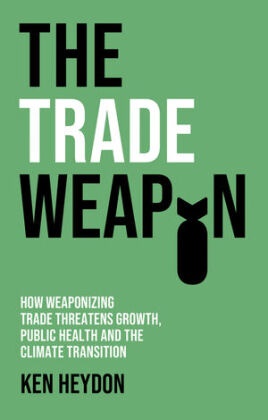Read more
Informationen zum Autor Ken Heydon is a former Australian government trade official, senior member of the OECD Secretariat, and Visiting Fellow at the London School of Economics. Klappentext Prompted by geo-strategic rivalry and the war in Ukraine, COVID-19 and the climate transition, trade policy is increasingly being weaponized. This trend towards protectionist capture and retaliation is self-sabotaging and bad for growth. But there is another way.In this hard hitting book, Ken Heydon offers alternatives to the trade weapon: the need for diplomatic carrots to accompany the sanctions stick; for resilience in supply chains, not self sufficiency through ill-advised reshoring and friendshoring; for multilateral, WTO, remedies to rule breaking, not unilateral penalties in the name of national sovereignty; and for direct action on environment and public health goals, not the blunt tool of trade restriction.But to restrain the damaging subordination of trade policy to other ends governments must address the discontents of trade and do better at helping losers, adjusting to technological change and making the case for open markets. At stake are three decades of income gains from globalisation and the ability to deal effectively with the climate transition and the next pandemic. Zusammenfassung Prompted by geostrategic rivalry and the war in Ukraine, COVID-19 and the climate transition, trade policy is increasingly being weaponized. This trend towards protectionist capture and retaliation is self-sabotaging and bad for growth. But there is another way.In this hard-hitting book, Ken Heydon offers alternatives to the trade weapon: the need for diplomatic carrots to accompany the sanctions stick; for resilience in supply chains rather than self-sufficiency through ill-advised reshoring and friend-shoring; for multilateral WTO remedies to rule breaking rather than unilateral penalties in the name of national sovereignty; and for direct action on environment and public health goals rather than the blunt tool of trade restriction.But, to restrain the damaging subordination of trade policy to other ends, governments must address the discontents of trade and do better at helping losers, adjusting to technological change and making the case for open markets. At stake are three decades of income gains from globalization and the ability to deal effectively with the climate transition and the next pandemic. Inhaltsverzeichnis List of Abbreviations List of Tables, Figure and Boxes Acknowledgements Preface Introduction: Free Trade: Winners and Losers 1. Sanctioning Aggression 2. Arming the Global Value Chain 3. Trade Self-Defence 4. Battling for the Greater Good 5. Arms Control: Restraining the Use of the Trade Weapon References Notes...

